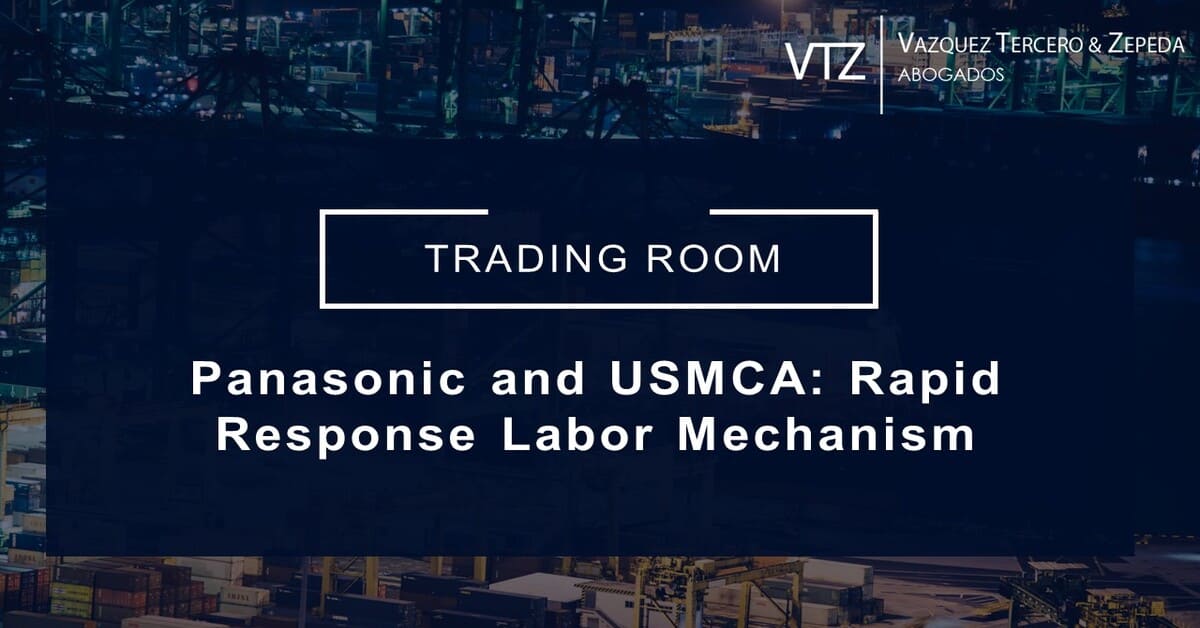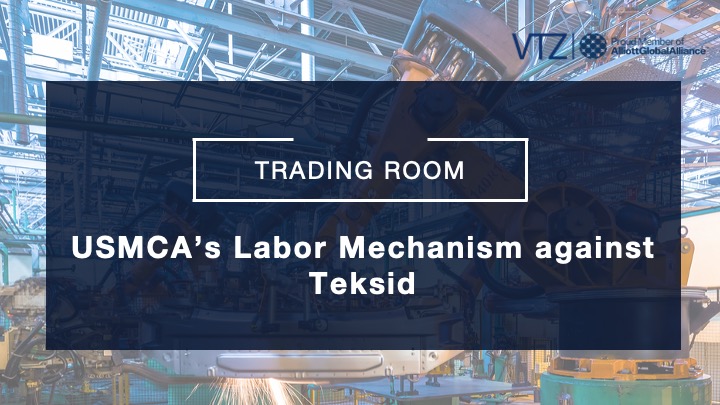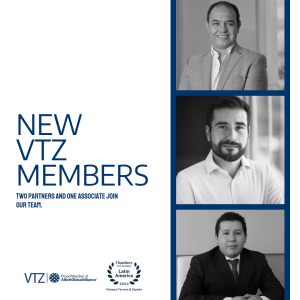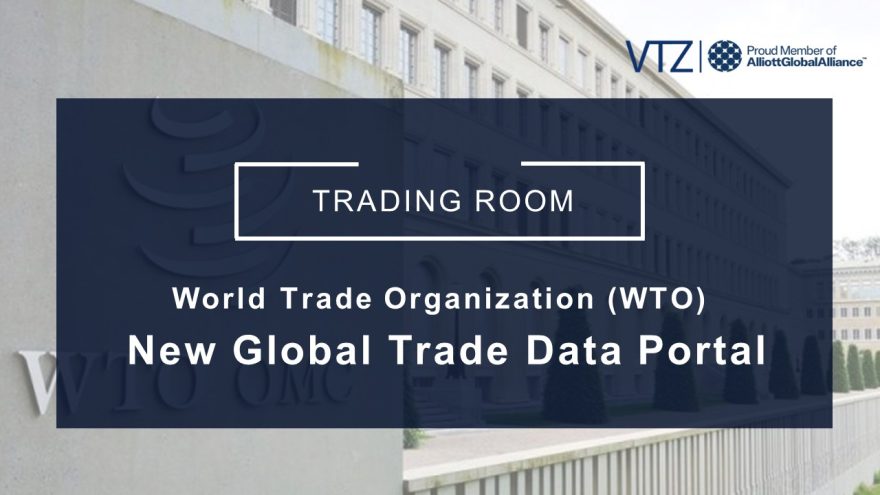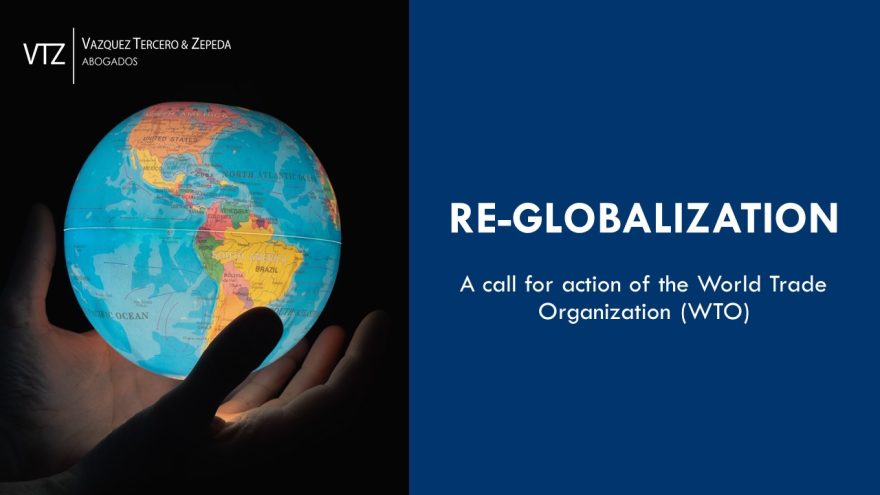Panasonic and USMCA : The Rapid Response Labor Mechanism
A new dispute involving Panasonic and USMCA. On May 18, 2022, the United States —through the Office of the United States Trade Representative (USTR)— requested Mexico to review whether a denial of free association and collective bargaining rights is occurring at Panasonic Automotive Systems de México S.A. de C.V. (Panasonic) in Reynosa, Tamaulipas. Particularly, the U.S. is «concerned» that Panasonic is maintaining a relationship with an «illegitimate» union and collective bargaining agreement (CBA) holder.
Panasonic and USMCA : Why USTR activated the Rapid Response Labor Mechanism?
The background of the present case is relatively recent and involves two unions: (1) The “Sindicato Industrial Autónomo de Operarios en General de Maquiladoras de la República Mexicana” (SIAMAR or «CTM Union»). This Union is affiliated with the «Confederación de Trabajadores de México» (CTM). (2) The “Sindicato Nacional Independiente de Trabajadores de Industrias y Servicios Movimiento 20/32” (SNITIS or «Independent Union”). This Union is led by Rosario Moreno..
The dispute over Union Representation in Panasonic
On September 22, 2021, Panasonic workers voted to legitimize the collective bargaining agreement. As reported (El Economista), almost 60% of the workers voted against maintaining the collective bargaining agreement with the CTM Union.
Despite the rejection and without having a Certification of Collective Bargaining Representative, the CTM Union entered into a new collective bargaining agreement with Panasonic. This new agreement was filed with the Local Labor Board of Conciliation and Arbitration on March 22, 2022 (La Jornada, June 8, 2022).
U.S. Requests to Review denial of rights in Panasonic
By virtue of this circumstance, the Independent Union and other organizations in the U.S. filed a request to review before the Inter-Agency Labor Committee for Oversight and Enforcement (ILC) on April 18, 2022.
New Election of Panasonic's Union Representation
Days later, on April 22 and 23, 2022, Panasonic workers voted to elect their union representation. Media reported that there were possible threats and altercations (La Jornada, June 08, 2022). At the end, the winner was the Independent Union with almost 75% of the workforce in favor of the union (Hoy Tamaulipas). And, it was reported, Panasonic did not heed the call to sign a new collective bargaining agreement (El Economista, June 8, 2022).
USTR's Request: Panasonic and USMCA
Thus, on May 18, 2022, when the USTR requested Mexico to review these facts and the possible and alleged denial of labor rights of Panasonic’s workers. Therefore, USTR requested to review:
«… This request for review encompasses all acts and events, by any person or entity, related to the signing, filing, implementation and preservation (including through payroll deductions) of such agreement or related to efforts to establish or maintain SIAMARM (CTM Union) as a representative of the workers; including through inducements, threats or any other action (including violent acts or dismissals) to obtain support in favor of SIAMARM (CTM Union) or the collective bargaining agreement registered with the Local Board, as well as actions affecting those who oppose SIAMARM (CTM Union).
The actions include any person or entity, including Panasonic, SIAMARM, and the Local Conciliation and Arbitration Board, and any of their employees, representatives or agents, as of October 7, 2021, as of the present date.»
Mexico's Response on Panasonic and USMCA
On May 26, 2022, the Ministry of Economy informed the U.S. Government that it accepted the request for review against Panasonic. In its press release, the Ministry of Economy stated the following:
“Based on this response, the Ministry of Economy, in coordination with the Ministry of Labor and Social Welfare and other agents involved, will review the case to determine whether or not there is a denial of labor rights in accordance with the provisions set forth in the Treaty between Mexico, the United States and Canada (USMCA).
The Government of Mexico reiterates its commitment to the effective application of the provisions established in the USMCA and in the national legislation, thus guaranteeing transparency and certainty for the workers of Mexico.”
Local Labor Board refuses to register Panasonic's Collective Bargaining Agreement
Interestingly, the Local Labor Board of Conciliation and Arbitration refused to register the collective bargaining agreement agreed between the CTM Union and Panasonic. This decision that was notified on June 3, 2022. The Local Labor Board refused to register said agreement, because the Federal Center for Conciliation and Labor Registration (CFCRL) is the only competent authority to register collective bargaining agreements as of November 3, 2021.
Strike in Panasonic?
In parallel to the rapid response labor mechanism, the Independent Union announced that a strike would break out on June 10, 2022 if they do not reach an agreement with Panasonic. After «tough» negotiations and four hours of strike action (Oncenoticas, June 10), the Independent Union and Panasonic reached a new agreement, which includes the following points (El Economista, June 10, 2022):
- 5% salary increase
- Payment of a one-time bonus of 3.5% of annual salary.
- Return of union dues, illegally deducted from their salaries.
- Two days of wages to those workers who went on strike due to union dues deductions.
- Creation of a Truth and Justice Commission
- Reinstatement of 24 workers
What are the next steps of USMCA's Rapid Response Labor Mechanism regarding Panasonic?
Pursuant to USMCA’s provisions on the Rapid Response Labor Mechanism, Mexico must submit a report to the United States within 45 days of the filing of the request (i.e., July 2, 2022). In such a report, the Ministry of Economy could either reject the denial of duties or accept that there was a denial of duties and report the reparation measures.
Panasonic and USMCA : VTZ Comment
This is the fourth time that the USMCA’s Rapid Response Labor Mechanism has been activated. All of them have been directed to automotive companies (i.e., General Motors, Tridonex, Teksid and Panasonic Automotive System).
Similar to the Teksid case, we believe that unions are and will continue to resort to the USMCA rapid response labor mechanism as a measure to add further pressure on the companies involved. Moreover, we note that the Local Board refused to register the collective bargaining agreement, but was it because of international pressure? In the end, this decision plays in Panasonic’s favor.
When this mechanism is activated, companies begin to feel the commercial «pressure» because tariff preferences are at stake. The USTR requests the U.S. Treasury to «suspend» the customs accounts of imports of the facility’s (company’s) products under investigation; that is, if a duty denial is determined, the facility’s goods would be subject to tariffs (or other measures).
By virtue of the facts reported after the request for review, it appears that Panasonic is avoiding the existence of a report confirming a denial of duties. This is because Panasonic:
- Recognized the Independent Union as the workers’ representative.
- Negotiated and signed a collective bargaining agreement with said union.
- Reached other agreements that seek to address and resolve problems identified in the USTR’s request for review, such as the issue of union dues deductions.
From a business standpoint, preventing the USMCA parties from reaching a denial of benefits determination is very significant. In the event of repetition or reiteration at the facility (or another facility owned by the same person), the measures or penalties may be more severe.
In our view, it only remains to be seen what the Secretary of Economy will record in its USMCA report, as well as whether the United States will accept such report.
More about USMCA’s Rapid Response Labor Mechanism
Need more information?
VTZ is a firm specialized in International Trade and Customs and IMMEX with a team with extensive experience, contact our members today:

Emilio Arteaga
Jr. Partner

